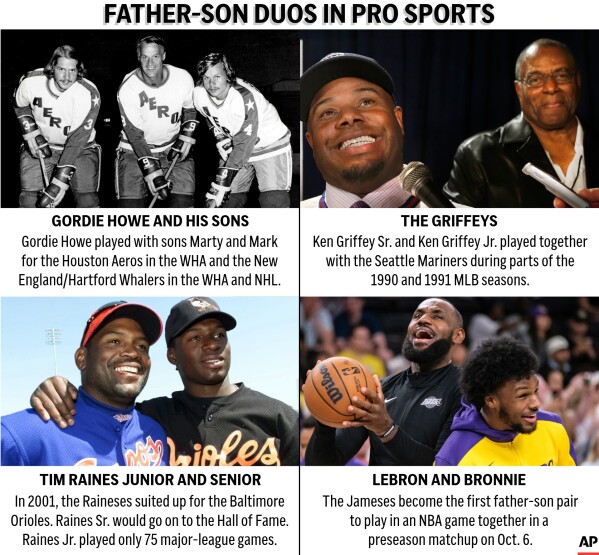LeBron James stood on the court next to his son Bronny and couldn’t help but glance over at him to take in the moment. The duo wore matching Los Angeles Lakers jerseys with “James” and “James Jr.” embroidered in big purple letters on their backs.
“It was like the matrix or something,” LeBron said afterward. “It just didn’t feel real.”
The Lakers helped the 39-year-old James realize a yearslong dream of playing alongside his son when they drafted Bronny with the 55th overall pick in June, making way for them to become first father-son pair to play in an NBA game together in a preseason matchup on Oct. 6.
Lakers general manager Rob Pelinka has described the draft pick as “magical,” while his organization has drawn criticisms about whether Bronny would have earned the opportunity if his father wasn’t one of the game’s greatest players. Those objections — albeit met with widespread excitement for the James family — reignited conversations about nepotism in sports and how powerful figures leverage their influence, while underscoring the stigma around kids following in the footsteps of a successful parent or family member.
“There’s always going to be people who are saying that things are nepotism,” said Alice Leppert, an associate professor of media and communication studies at Ursinus College in Pennsylvania. “There’s going to be some cynical assumption that strings were pulled and basically that things are not fair.”
That’s often based on people’s desire to believe in a meritocracy, Leppert said, referring to the system where someone gains status or rewards based on his or her abilities, not wealth or social status.
“In general, we don’t live in a meritocracy,” Leppert added. “We want to live in a meritocracy, and that’s why we get these sorts of debates.”
For centuries, children born into rich and powerful families have inherited businesses, stardom and endless resources for success — a conspicuous display of power in Hollywood, politics and sports.
Critics of nepotism argue that those without the same access to resources — i.e. producers and directors in the entertainment industry, scouts and training facilities in sports — are left at a significant disadvantage when it comes to opportunities.
Others question why a practice so ingrained in society is being even being mentioned.
“I don’t want to hear these charges, people talking about nepotism,” former ESPN NBA insider Adrian Wojnarowski said during the NBA draft. “The NBA is full of nepotism. The ownership level, front offices, coaching. I don’t want to hear it all of a sudden because Bronny James’ father plays for the Lakers. It is rampant in this league.”
There have been about 100 instances in NBA history of players joining the league after their fathers played. Those young men stepped into the league after the father’s career ended, but they include Stephen and Dell Curry, Kobe and Joe “Jellybean” Bryant, Bill and Luke Walton, among others.

Ken Griffey Sr. and Ken Griffey Jr. played together with the Seattle Mariners during parts of the 1990 and 1991 MLB seasons. Hockey great Gordie Howe played with sons Marty and Mark for the Houston Aeros in the WHA and the New England/Hartford Whalers in the WHA and NHL.
In the 65 schools that compete in major college football, there are at least 25 instances of family members on the same coaching staff, according to an Associated Press examination of coaching rosters in 2022. In the NFL, 16 of the league’s 32 owners inherited their teams from family, per a study done by USA Today.
“I think we’re resigned in this country to the fact that if you own it, you can do whatever you want with it,” said David Grenardo, a law professor and sports law expert at the University of St. Thomas in Minnesota. “So I’m the owner. I can pass it down to my kids … And that’s somewhat acceptable because that person has the right to do with their property what they want.”
That acceptance changes when it comes to athletes, Grenardo said.
“That is where we are completely uncomfortable with the idea of someone getting an opportunity that they did not deserve,” he said, noting the intrigue of watching the best compete against the best in sports.
“So then when you have a situation where someone who may not be perceived as the best is getting an opportunity over someone else, and now it’s not a meritocracy, now it’s become political, now it becomes, ‘well whose kid is that?’” Grenardo said.
That’s where nepotism conversations have sprouted around Bronny, whose critics have argued that he was unproven before being drafted and has earned more attention than almost any other late second-round pick in NBA history.
After recovering from cardiac arrest over a year ago, Bronny played one season at Southern California before entering the draft. He has been praised for his athleticism, definsive ability and work ethic but averaged 4.8 points and 2.8 rebounds while starting six of 25 games for the Trojans.
“Part of this discourse with LeBron and his son Bronny is that he is a visible African American athlete,” said C. Keith Harrison, a professor specializing in sports and business management at the University of Central Florida. “And for some reason it’s being perceived that he’s not going to leverage any power and privileges that he has as an American, as an American Black man, as a successful athlete, entrepreneur or business person.”
Harrison pointed to plenty of examples of sports figures exercising their influence through nepotism: the Buss family’s ownership of the Lakers; the Harbaugh family, which has an extensive football coaching lineage.
“If we have these monikers, or these approaches and these realities of nepotism, and people hiring who they are comfortable with … when it comes to (LeBron) and his son Bronny, why is this popping up?” Harrison said.
Grenardo, separately, reached his own conclusion.
“Some of it may very well just be race,” he said. “That here’s a Black man who’s one of the few Black billionaires and that’s an American. And he is using his power like others have used their power as well, but ‘I don’t like it that he now is that powerful.’”





